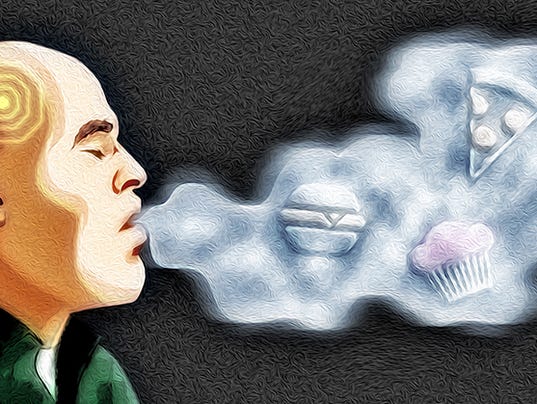
culled from:usatoday.com
Greasy burgers, oily pizza, raw cookie dough – anything's fair game for someone with the munchies, the insatiable hunger that strikes marijuana users. Now scientists have identified a surprising new brain circuit behind those pot-fueled snack attacks.
The munchies are triggered in part by brain cells that normally turn down appetite, according to a new study in this week's Nature. Under the influence of pot, these circuits switch from signaling "Don't eat" to "Eat!" even if the body doesn't need any food.
At first glance, the finding was completely "nonsensical," says study author Tamas Horvath, a neurobiologist at Yale University School of Medicine. It's as if "you're driving down a hill and you brake, brake, brake, and all of a sudden the brake becomes an accelerator."
The biology of pot was not on Horvath's mind when he and his colleagues embarked on a series of experiments involving a synthetic version of one of the active ingredients in marijuana. The research was merely supposed to confirm the nerve circuits that tamp down hunger.
Instead, the results were "upside down," Horvath says. He thought there must be some kind of mistake and asked his students to repeat the experiments. They got the same results.
The brain cells pinpointed by Horvath's lab are the POMC neurons, which under normal circumstances suppress the impulse to eat. But when the researchers dosed mice with an imitation marijuana chemical, it activated the POMC neurons.
At the same time, mice that should have been sleeping began gobbling their chow, even though "it's not a very exciting food for them. Imagine if we'd given them some good stuff," Horvath says. Mice dosed with the drug might gorge on three or four times their normal amount of food, depending on how the drug was given.
Other tests showed that the active POMC cells were essential to the ferocious appetite the mice developed. Horvath suspects the POMC nerve cells could also be involved in creating the high associated with marijuana because other studies show that the POMC cells have a role in complex behaviors beyond eating.
The finding is "fascinating," says the Vanderbilt University Medical Center's Roger Cone, who was not involved with the study. But he adds that a number of other brain networks have been implicated in the munchies. Another recent study, for example, found that a marijuana chemical binds to nerve cells involved with smell, which may make food more enticing.
Horvath and his team also discovered that POMC neurons trigger eating by releasing one of the body's natural painkillers, notes neuroscientist Nicholas DiPatrizio of the University of California, Riverside School of Medicine. So the new work might help lead to new techniques for managing pain as well as illuminating some of the complex brain machinery controlling why and how we feel hungry.
 RSS Feed
RSS Feed Twitter
Twitter

 06:12
06:12
 Executive Republic
Executive Republic
 Posted in
Posted in
too much of food is not good for the body....... ADEBOWALE OLUWASEUNFUNMI
ReplyDeletetoo much of food is not good for the body......AKINLAJA ADERONKE
ReplyDeletetoo much of food is not good for the body......ALEEM SEMIAT
ReplyDeletetoo much of food is not good for the body....JEJE FATIMOH
ReplyDeletetoo much of food is not good for the body....BELLO MUSTAPHA
ReplyDeletetoo much of food is not good for the body....TINUOYE ABIODUN
ReplyDelete